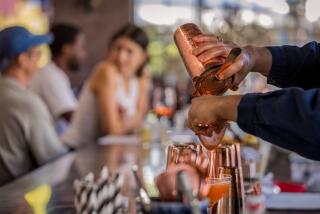Opinion: What does California’s Proposition 47 have to do with date rape?
Would Proposition 47 increase the likelihood of date rape? That is, in essence, one of the chief arguments that opponents make against the measure. The claim is a stretch -- but it is not utterly groundless and it helps outline why initiatives can be a hazardous way to make criminal law.
At the heart of the issue are “roofies,” slang for Rohypnol, a kind of super-Valium that became a notorious club drug in the 1990s and remains on the scene today. Other so-called date-rape drugs include GHB and Ketamine, but they, unlike Rohypnol, are legal in the United States with a proper prescription. Rohypnol is prescribed in other countries for various conditions, including insomnia, but not here.
In the typical scenario, as described in police reports and depicted in TV dramas, a would-be rapist chats up his intended victim at a bar, then slips the drug into her drink as she’s looking the other way. Or the drug is dropped into the punch bowl at a fraternity party; some guests are warned, some are not. The unwitting victim becomes woozy and finally incapacitated, unable to fend off a sexual attack or even to remember it afterward.
So what do these drugs have to do with Proposition 47? The initiative doesn’t mention rape -- except to make clear that nothing in the measure would alter the charges or sentencing for rape or any other violent offense.
Six other crimes that currently can be charged as felonies would be converted to misdemeanors. They include simple drug possession, shoplifting and check kiting -- but definitely not rape. Inmates already doing felony time for any of those six crimes would be able to petition to have their sentences reduced, but not if they have prior convictions for certain violent crimes -- such as rape. The measure is not intended to help rapists.
Opponents point out, though, that in reducing simple possession of most controlled substances from felonies or wobblers to misdemeanors, Proposition 47 covers roofies. Currently, a person caught with Rohypnol in his pocket can be prosecuted for a felony and end up in state prison for three years. If the initiative passes, he would be liable only for a misdemeanor, punishable by up to a year in jail and a $1,000 fine. But, as a practical matter, he may do no jail time at all. It would be merely a “slap on the wrist,” according to the ballot pamphlet rebuttal arguments signed by, among others, Sandra Henriquez, executive director of California Coalition Against Sexual Assault.
“Prop. 47 undermines laws against sex crimes,” adds the pamphlet’s opposition argument.
Besides, opponents note, roofies aren’t like other drugs. Heroin or cocaine may be addictive and incapacitating, but at least people administer those substances to themselves. Roofies, the argument goes, are drugs of assault: Substances administered to others to victimize them. At an Oct. 2 legislative hearing, Shaina Brown of the California Coalition Against Sexual Assault testified that there are 3 million victims of drug-facilitated sexual assault, commonly abbreviated as DFSA.
Opponents don’t argue that the authors of Proposition 47 wanted to undermine laws against sex crimes, merely that they drafted the measure poorly and in so doing inadvertently included possession of date rape drugs along with other controlled substances.
And that is an inherent problem with initiatives: There are no legislative hearings where flaws can be noted and kinks worked out. Once they pass, mistakes are hard to correct.
“The actual problem with the initiative is that it is an initiative,” the Los Angeles Times wrote in its endorsement of Proposition 47. “Criminal sentencing laws should not be made by ballot measure.”
So a certain wariness makes sense. But it doesn’t necessarily follow that Proposition 47 weakens laws against sexual assault.
Proposition 47 does not reduce any charge or penalty for sexual assault, including date rape. Rapes, including those that involve involuntary intoxication, would continue to be felonies under Penal Code Sec. 261. Lacing someone’s drink with Rohypnol or any other date rape drug would continue to be a felony, even if the intended victim does not actually ingest it. Possession of the drug would remain usable as evidence of intent in felony assault cases. Possession would remain a state crime punishable by up to a year; and it would in fact remain a felony under federal law pursuant to 21 U.S.C. Sec. 844.
Statewide stats on how many people each year caught with roofies in their possession, during a traffic stop, for example, are hard to come by. Police simply don’t line up at the doors to college dorm or fraternity parties, or bars, to frisk everyone for roofies as they walk in; nor would they be able to, absent probable cause to believe someone has the drug in his or her possession.
So if Proposition 47 passes, will would-be rapists who now steer clear of roofies begin stocking up, knowing that the penalties for simple possession have dropped from a felony and three years behind bars to a misdemeanor and one year behind bars?
It’s not likely. Rohypnol can be a dangerous tool of assault, but most law enforcement and prosecutorial agencies agree that the substance most involved in rape of either acquaintances or strangers is alcohol, despite laws governing its use.
The real issue is whether Proposition 47 drafters, in trying to reduce charges and penalties for things such as simple possession of meth or crack, intended to include roofies and other drugs that can be used as assault tools, or whether they simply missed the fact that they were also reducing the charges for possession of Rohypnol. And, if so, whether they missed something else.
Twitter: @RGreene2
More to Read
A cure for the common opinion
Get thought-provoking perspectives with our weekly newsletter.
You may occasionally receive promotional content from the Los Angeles Times.







